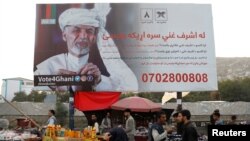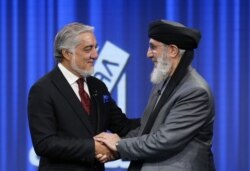Amid concerns about violence, fraud and possible post-election chaos, candidates wrapped up their 60-day campaigns in Afghanistan on Wednesday, ahead of Saturday's presidential polls.
Opponents of President Ashraf Ghani, who is running for his second term, have accused him of misuse of state resources throughout the campaign.
Abdullah Abdullah, one of the leading candidates who has also been in a power-sharing arrangement with Ghani for the last five years, said Ghani was losing and would try to "win by fraud, but we won't let him."
Candidate Gulbuddin Hekmatyar, a former warlord who accepted Ghani's offer of a peace deal, warned of dire consequences if the elections were not free and fair.
"The situation will spiral out of everyone's control, and neither the government nor the foreign forces will be able to bring a halt to it," he told The Associated Press in an interview.
Warning on violence
Speaking to his supporters in Kabul, Hekmatyar warned that allegations of fraud could lead to violence.
"Don't make us regret our return. Don't make us regret participating in the electoral process. Don't make us use other means. We can do it and we have the experience to be able to do it," he said.
He also warned foreign stakeholders in Afghanistan against trying to manage the results.
After widespread allegations of massive fraud threatened to destabilize the country in the 2014 presidential elections, the United States stepped in. Then-Secretary of State John Kerry helped patch up a deal between the two leading candidates. Ghani became president, and Abdullah was given the title of chief executive.
Afghan presidential office spokesman Sediq Sediqi said the allegations that Ghani was misusing any government resources were not true.
"I can assure you that the president has not used government property or offices for [the] campaign," he said, adding that anyone with a legitimate complaint should take it to the Election Complaints Commission.
Former President Hamid Karzai told the AP in an interview that the elections should be postponed until a peace process yielded results.
"We cannot conduct elections in a country that is going through a foreign-imposed conflict. We are in a war of foreign objectives and interests. It isn't our conflict. We are only dying in it," he said.
US-Taliban talks
Afghan presidential elections, which have already been delayed twice, were in doubt until earlier this month as negotiations between the Taliban and the United States seemed to gain momentum. The unexpected collapse of those talks not only gave a new impetus to the election campaign but also led to an intensification of violence.
The Taliban have threatened the elections and warned civilians to stay away from rallies and polling booths or suffer the consequences. They have already claimed attacks on several rallies, including an attack on a Ghani rally that claimed at least 26 lives.
To deal with Taliban and other threats, including Islamic State, around 72,000 members of the Afghan National Defense and Security Forces will be responsible for securing nearly 5,000 polling centers across Afghanistan. Another 20,000 to 30,000 will act as reserve forces, ready to be deployed to any part of the country that needs reinforcements.
If none of the candidates receives 50% of the votes, the election goes to a second round in which only the two leading candidates can participate.
Most observers believe the current election has a high probability of going to a second round.





